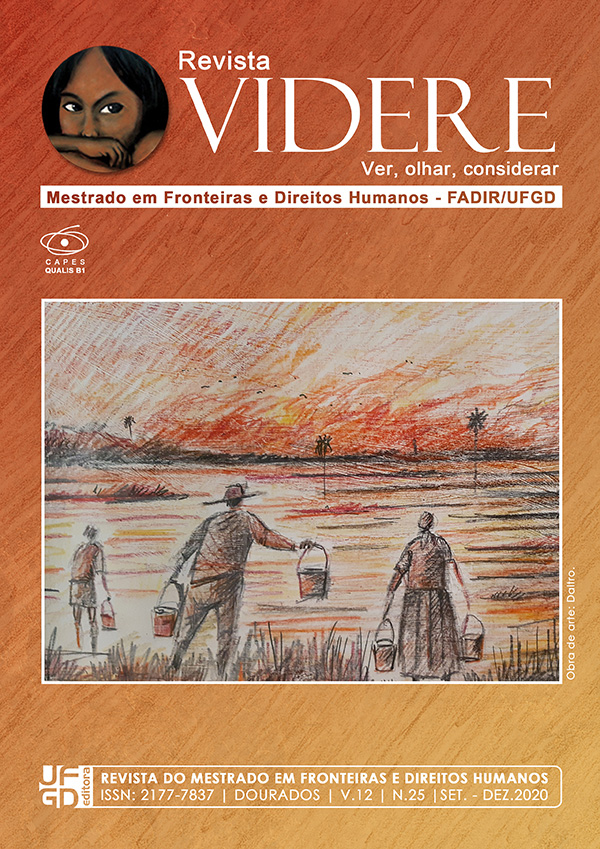Labor law contrarreforms and (surplus)valuation of collective bargaining in the context of sanitary crisis
DOI:
https://doi.org/10.30612/videre.v12i25.11789Keywords:
Collective bargaining. Precariousness. Surplus-valuation. Individual autonomy of the will. COVID-19.Abstract
The article deals with the changes brought in the brazilian labor legislation granting collective bargaining permissiveness to make legal labor rights more flexible. Taking the historical and dialectical materialism as method, and discussing dogmatic, historical and social aspects of legality, the study seeks to demonstrate that this legislative change, despite having ideological traits that signal in a different sense, is a reflection of the bourgeois offensive against labor rights, evidencing that (i) the “valorization” of the collective composition does not bring prestige to social concertation as an effective mean for adjusting labor relations; (ii) that its main functionality is the induction to deepen the workforce exploitation, hence it can be read as an surplus-valuation of collective bargaining; (iii) serving as a relevant fissure to provide openings to the radicalization of the individual autonomy of the will, such as the judgment by the Brazilian Supreme Court of the ADI 6.363, in April 2020, in the context of the sanitary crisis resulting from the pandemic of COVID-19.Downloads
References
AGÊNCIA CNI. “7 motivos para valorizar a negociação entre empresas e trabalhadores”, disponível em: http://www.portaldaindustria.com.br/agenciacni/noticias/2016/03/7-motivospara-valorizar-a-negociacao-entre-empresas-e-trabalhadores-1/. Acesso em: 23 abr. 2018.
BATISTA, Flávio Roberto. SEFERIAN, Gustavo. Financiamento sindical, direito do trabalho e crise: aproximações empíricas à funcionalidade do direito do trabalho para o capitalismo. Direito & Práxis, v. 11, n.4, 2020.
BOITO JÚNIOR, Armando. O sindicalismo de Estado no Brasil: uma análise crítica da estrutura sindical. São Paulo: Hucitec, 1991.
EDELMAN, Bernard. A legalização da classe operária. Trad. Marcus Orione et alii. São Paulo: Boitempo,. 2016
FOLHA DE SÃO PAULO, “Governo agora acena com reforma trabalhista e previdenciária e simplificação tributária”, disponível em: http://www1.folha.uol.com.br/mercado/2015/12/1722056-equipe-economica-quer-definirna-proxima-semana-medidas-para-2016.shtml. Acesso em: 24 abr. 2018.
MARTINS FILHO, Ives Gandra. “Valorização da negociação coletiva e flexibilização das normas legais trabalhistas”. Revista Jurídica, Brasília, v. 8, n. 79, p.01-07, jun./jul., 2006.
MARX, Karl. ENGELS, Friedrich. Manifesto Comunista, Trad. Álvaro Pina. São Paulo: Boitempo, 2010.
MAUAD, Marcelo José Ladeira. Cooperativas de Trabalho: sua relação com o Direito do Trabalho. São Paulo, LTr, 1999.
MEIRELLES, Davi Furtado. “O acordo coletivo especial”. Revista do Tribunal Regional do Trabalho da 2ª Região, São Paulo, SP, n. 12, p. 39-47, 2012.
SEVERO, Valdete Souto. SOUTO MAIOR, Jorge Luiz. Os 201 ataques da “reforma” aos trabalhadores. Disponível em: , publicado em 08.05.2017, acessado em 09.03.2018.
PMDB. “Uma ponte para o futuro”. Disponível em: https://www.fundacaoulysses.org.br/wpcontent/uploads/2016/11/UMA-PONTE-PARA-O-FUTURO.pdf. Acesso em: 24 abr. 2018.
RODRIGUEZ, Américo Plá. Princípios do Direito do Trabalho. 3ª ed. Trad. Wagner D. Giglio. São Paulo: LTr, 2000.
SEFERIAN, Gustavo. Direito do trabalho como barricada: sobre o papel tático da proteção jurídica do trabalhador. Tese de doutorado defendida junto à FDUSP, 2017a.
SEFERIAN, Gustavo. Leitura neoliberal do Direito do Trabalho e ideologia: cenas de ontem, hoje e amanhã. In: MURADAS, Daniela (coord.). Manipulações capitalistas e o Direito do Trabalho. Belo Horizonte: RTM, 2017b.
SEFERIAN, Gustavo. Sobre o uso da miséria historiográfica e a relevância da investigação histórica na aplicação do Direito do Trabalho. Revista Da Faculdade De Direito Da UFG, n.43, 2019.
STF. Medida cautelar na Ação Direita de Inconstitucionalidade 6.363 Distrito Federal. Disponível em: www.stf.jus.br/arquivo/cms/noticiaNoticiaStf/anexo/ADI6363.pdf , publicado em 04.04.2020. Acesso em: 20 abr. 2020.
Downloads
Published
How to Cite
Issue
Section
License
Authors must accept the publication rules when submitting the journal, as well as agree to the following terms:
(a) The Editorial Board reserves the right to make changes to the Portuguese language in the originals to maintain the cultured standard of the language, while respecting the style of the authors.
(b) Authors retain the copyright and grant the journal the right to first publication, with the work simultaneously licensed under the Attribution-NonCommercial-ShareAlike 3.0 Brazil (CC BY-NC-SA 3.0 BR) that allows: Share - copy and redistribute the material in any medium or format and Adapt - remix, transform, and create from the material. CC BY-NC-SA 3.0 BR considers the following terms:
- Attribution - You must give the appropriate credit, provide a link to the license and indicate whether changes have been made. You must do so under any reasonable circumstances, but in no way that would suggest that the licensor supports you or your use.
- NonCommercial - You may not use the material for commercial purposes.
- Sharing - If you remix, transform, or create from material, you must distribute your contributions under the same license as the original.
- No additional restrictions - You may not apply legal terms or technological measures that legally restrict others from doing anything that the license permits.
(c) After publication, authors are allowed and encouraged to publish and distribute their work online - in institutional repositories, personal page, social network or other scientific dissemination sites, as long as the publication is not for commercial purposes.



















